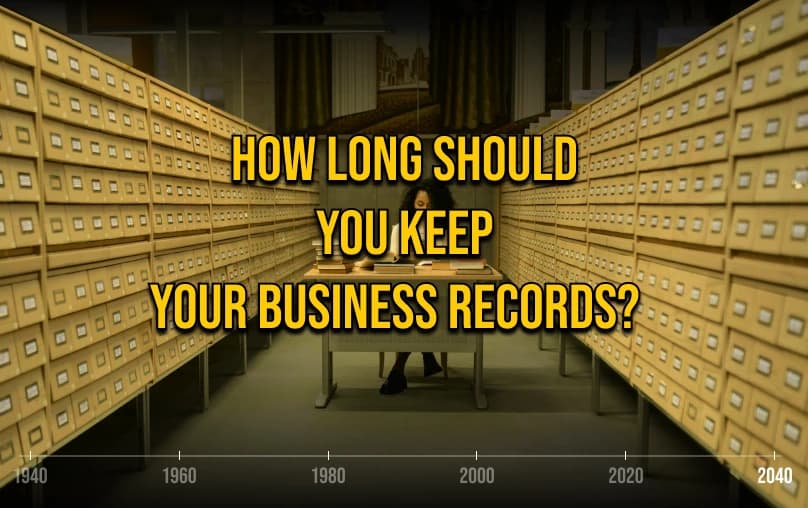
You have been running your business for about five years now. You have seen wins, weathered a few rough patches, and overall, you are doing pretty well.
But now, you are staring at filing cabinets stuffed to the brim, cloud folders overflowing, and receipts popping out of drawers like jack-in-the-boxes.
Sounds familiar, right?
It is totally normal. Over the years, documents pile up like bank statements, employee forms, tax returns, contracts, invoices... and the list goes on and on.
So, here comes the million-dollar question: How long do you actually need to keep all these business records?
Let us break it down.
First off, why is recordkeeping even a big deal?
Imagine this: running a business without keeping records is like trying to bake a cake without measuring the ingredients.
Sure, you might end up with something edible, but it’s risky and might fall flat.
Your records are your proof, your receipts, your alibis, your superhero cape if someone questions your moves.
Here's how recordkeeping helps:
• Protects YOU: Whether it’s the IRS knocking, an investor doing a check-in, or a legal hiccup, solid records are your safety net.
• Ensures Clarity for Your Employees: In the event of pay disputes, promotions, or benefits, records provide clear documentation to back up decisions.
• Builds Trust with Your Customers: When customers question a detail, like materials used, having accurate records helps you quickly provide proof and resolve the issue.
Types of Business Records You Should Keep
Think of your records like a group of friends at a party, each one plays a different role, and some of them definitely hang longer than others.
1. Financial Records
This includes bank statements, credit card bills, receipts, ownership docs, anything that involves your business's money trail.
You will need these:
• To analyze your business health
• For audits, whether by Uncle Sam or your investors
• To solve financial disputes like a boss
2. Employee Records
Got a team? Then you’ve got employee docs. We’re talking about social security info, I-9 forms, payment records, agreements, basically everything related to HR.
These protect you from:
• Compensation disagreements
• Tax issues
• Legal problems (especially around work eligibility)
3. Tax Records
These are the heavy hitters, tax returns, deductions, write-offs, invoices, anything that supports your tax filings.
You need these:
• For filing next year’s taxes
• If you’re audited
• To qualify for grants or funding later on
So… How Long Do I Keep This Stuff?
Let’s get into the nitty-gritty.
Different records = different shelf lives.
Here’s a handy cheat sheet.
1. Financial & Tax Records:
Minimum: 3 years
But here’s the twist:
• Keep for 6 years if you accidentally didn’t report more than 25% of your income. (Oops!)
• Keep for 7 years if you’re claiming a loss on bad debt or worthless investments.
• Keep forever if you never filed a return or you filed a less-than-honest one.
2. Employee Payroll & Tax Records:
Keep for 3 to 7 years, depending on your state.
For example, Hawaii wants you to keep payroll records for 6 years. So, always check your local laws.
3. Property Records:
If you sell your office building, keep any related documents for at least 3 years after the sale.
What Happens If I Don’t Keep Records?
Let’s not sugarcoat it, it can get really messy.
• Fees & Fines: The IRS doesn’t care if your dog ate your receipts. No proof? You could end up paying more than you should.
• Legal Trouble: If an employee says they didn’t get paid right and you have no records… well, good luck in court.
• Missed Opportunities: Without good records, you might miss important trends, fail to cut costs, and lose the chance to impress investors.
Ask Yourself These Questions When You’re Tempted to Toss Something:
1. Is this tied to taxes?
Keep it as long as the IRS wants you to (check the periods of limitation here).
2. Is this related to property or big assets?
Keep until after you sell, plus 3 years.
3. Could someone come to ask about this later?
If yes, it’s worth keeping.
4. Does my state require longer retention?
Always check!
Tips to Stay Sane with Recordkeeping
• Set a schedule: Pick a day monthly or quarterly to review, sort, and shred (or archive).
• Use cloud tools: Tools like Google Drive, Dropbox, or QuickBooks help you stay organized.
• Label everything clearly: You’ll thank yourself when you’re not digging through a digital dumpster six months from now.
• When in doubt, keep it: If you're unsure whether you should keep a document, it's better to hold on just in case you might need it later.
Stay Organized, Stay Protected
Keeping business records doesn’t have to be scary or overwhelming. Think of it like brushing your teeth, it’s not fun, but it’s necessary to avoid the pain later on. If you treat it like a habit and stay consistent, you’ll avoid stress, protect your biz, and maybe even impress a future investor.
Just remember, keep what you need, ditch what you don’t, and double-check those time limits so you’r always covered.
Want to deep-dive into what the IRS says? You can check out their official guidelines here.

Shekhar Mehrotra
Founder and Chief Executive Officer
Shekhar Mehrotra, a Chartered Accountant with over 12 years of experience, has been a leader in finance, tax, and accounting. He has advised clients across sectors like infrastructure, IT, and pharmaceuticals, providing expertise in management, direct and indirect taxes, audits, and compliance. As a 360-degree virtual CFO, Shekhar has streamlined accounting processes and managed cash flow to ensure businesses remain tax and regulatory compliant.
You might also like:
Listen Exclusive Podcast On

